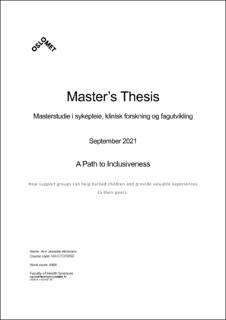| dc.description.abstract | Being bullied is associated with anxiety, depression symptoms, and long-time negative health
outcomes. The aim of this qualitative study was to explore bullied children’s experiences with
support groups as a tool against bullying and how participating in a group affected the
children. The sample consisted of 24 children aged 11-13, four of whom were bullied. Four
individual and four focus group interviews were conducted at the children’s schools. A
Solution-Focused-Approach (SFA) forms the basis on which support groups as an
intervention are built. The interview guide was prepared in line with an exploratory design, the
questions were open-ended, contained elements of SFA, and with the purpose of gaining an
insight into the participants' own experiences. In the process of analyzing the data Graneheim
& Lundman`s (2004) model for qualitative content analysis was used. The main theme
identified in this study was that support groups provide an opportunity for change and can help
children to be included among peers. The bullied children explained how they found it hard to
open up about difficulties but experienced that when they did the situation changed. From
feeling alone at school, they were included among peers. The changes were made through
challenges, encouragement, and support from peers and the school nurse or social teacher.
The children participating in the support groups reported a feeling of being selected to do an
important job. The fellowship the groups provided, together with the opportunity to help a peer,
made them feel good about themselves. They also experienced that contributing could be
challenging and a demanding role to play. Both getting support and being part of a support
group contributed to inclusion, strength, and valuable experiences. The findings suggest that a
systemic approach to bullying is advantageous, emphasizing the importance school nurses
and teachers play in bringing about change. | en_US |
